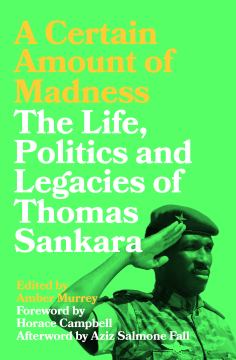
Additional Information
Book Details
Abstract
Thomas Sankara was one of Africa's most important anti-imperialist leaders of the late 20th Century. His declaration that fundamental socio-political change would require a 'certain amount of madness' drove the Burkinabe Revolution and resurfaced in the country's popular uprising in 2014.
This book looks at Sankara's political philosophies and legacies and their relevance today. Analyses of his synthesis of Pan-Africanism and humanist Marxist politics, as well as his approach to gender, development, ecology and decolonisation offer new insights to Sankarist political philosophies. Critical evaluations of the limitations of the revolution examine his relationship with labour unions and other aspects of his leadership style. His legacy is revealed by looking at contemporary activists, artists and politicians who draw inspiration from Sankarist thought in social movement struggles today, from South Africa to Burkina Faso.
In the 30th anniversary of his assassination, this book illustrates how Sankara's political praxis continues to provide lessons and hope for decolonisation struggles today.
'This book by a wide range of committed scholars, including, crucially, a significant number of African scholars, is a necessary and illuminating intervention. The Sankara that emerges here is more than 'Africa's Che Guevara', a man whose ideas and politics are 'rich with a thousand nuances' that distinguish them from other forms of Marxism and Pan-Africanism. Sankara comes alive in all his complexity'
Sean Jacobs, Associate Professor of International Affairs at The New School and Founder and Editor, Africa is a Country
'Students of African Studies in particular and anyone else interested in a detailed account of unsung African heroes would appreciate this beautiful compilation'
African Studies Review
'The legendary Thomas Sankara - hero, revolutionary leader, anti-imperialist - receives deserving analytical treatment from the most prominent radical voices here assembled for one the greatest sons of Africa. The book enhances our understanding of the pragmatism of politics, the rhetoric of revolutionary actions, and the resurgence of reactionary forces. A must read'
Toyin Falola, Honorary Professor, University of Cape Town, University Distinguished Professor and Jacob and Frances Sanger Mossiker Chair in the Humanities, The University of Texas at Austin
Table of Contents
| Section Title | Page | Action | Price |
|---|---|---|---|
| Cover | Cover | ||
| Contents | vii | ||
| Foreword: The Life and Legacy of Thomas Sankara - Horace G. Campbell | xi | ||
| Acknowledgements | xvii | ||
| Introduction - Amber Murrey | 1 | ||
| Part I: Life and Revolution | 19 | ||
| 1. Military Coup, Popular Revolution or Militarised Revolution? Contextualising the Revolutionary Ideological Courses of Thomas Sankara and the National Council of the Revolution - De-Valera N.Y.M. Botchway and Moussa Traore | 21 | ||
| 2. The Perils of Non-Alignment: Thomas Sankara and the Cold War - Brian Peterson | 36 | ||
| 3. Thomas Sankara and the Elusive Revolution - Leo Zeilig | 51 | ||
| 4. When Visions Collide - Thomas Sankara, Trade Unions and the Revolution in Burkina Faso, 1983-1987 - Craig Phelan | 62 | ||
| 5. Africa's Sankara: On Pan-African Leadership - Amber Murrey | 75 | ||
| 6. Who Killed Thomas Sankara? - Bruno Jaffré | 96 | ||
| 7. 'Incentivised' Self-Adjustment: Reclaiming Sankara's Revolutionary Austerity from Corporate Geographies of Neoliberal Erasure - Nicholas A. Jackson | 113 | ||
| Part II: Political Philosophies | 125 | ||
| 8. Madmen, Thomas Sankara and Decoloniality in Africa - Ama Biney | 127 | ||
| 9. With the People: Sankara's Humanist Marxism - Ernest Harsch | 147 | ||
| 10. Thomas Sankara and Tajudeen Abdul-Raheem: The Untimely Deaths of Two New Generation African Visionaries - Patricia Daley | 159 | ||
| 11. Women's Freedoms are the Heartbeat of Africa's Future: A Sankarian Imperative - Patricia McFadden | 170 | ||
| 12. Re-reading Sankara's Philosophy for a Praxeology of Debt in Contemporary Times - Sakue-C. Yimovie | 180 | ||
| 13. Sankara's Political Ideas and Pan-African Solidarity: A Perspective for Africa's Development? Felix Kumah-Abiwu and Olusoji Alani Odeyemi | 194 | ||
| 14. 'Revolution and Women's Liberation Go Together': Thomas Sankara, Gender and the Burkina Faso Revolution - Namakula E. Mayanja | 209 | ||
| Part III: Legacies | 223 | ||
| 15. Balai Citoyen: A New Praxis of Citizen Fight with Sankarist Inspirations - Zakaria Soré | 225 | ||
| 16. La Santé Avant Tout: Health Before Everything - T. D. Harper-Shipman | 241 | ||
| 17. Social Movement Struggles and Political Transition in Burkina Faso - Bettina Engels | 255 | ||
| 18. To Decolonise the World: Thomas Sankara and the 'Last Colony' in Africa - Patrick Delices | 269 | ||
| 19. 'Daring to Invent the Future': Sankara's Legacy and Contemporary Activism in South Africa - Levi Kabwato and Sarah Chiumbu | 286 | ||
| Part IV: Contestations and Homages | 305 | ||
| 20. The Academy as Contested Space: Disappearing Sankara from the 'Acceptable Avant-Garde' - Nicholas A. Jackson | 307 | ||
| 21. Art and the Construction of a 'Sankara Myth': A Hero Trend in Contemporary Burkinabe Urban and Revolutionary Propaganda Art - Sophie Bodenes Cohen | 313 | ||
| 22. Slanted Photography: Reflections on Sankara and My Peace Corps Experience in Burkina Faso - Celestina Agyekum | 328 | ||
| 23. 'We Are the Children of Sankara': Memories as Weapons during the Burkinabe Uprisings of 2014 and 2015 - Fiona Dragstra | 335 | ||
| Afterword - Aziz Salmone Fall | 349 | ||
| Notes on Contributors | 361 | ||
| Index | 367 |
